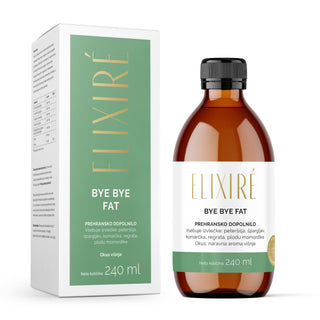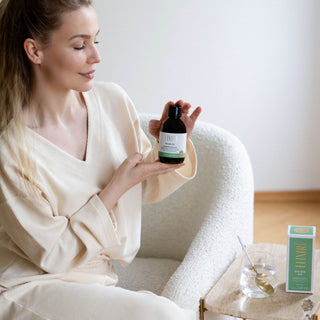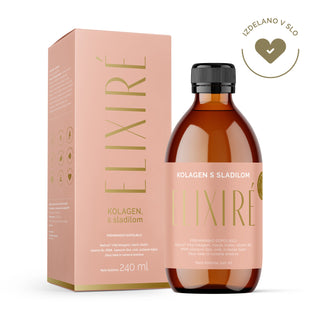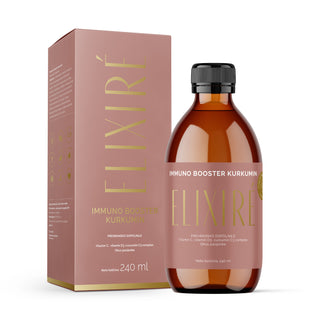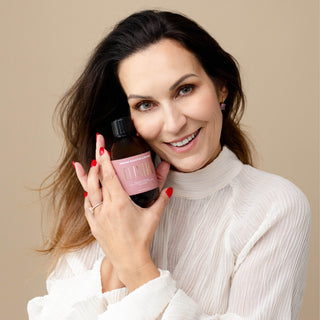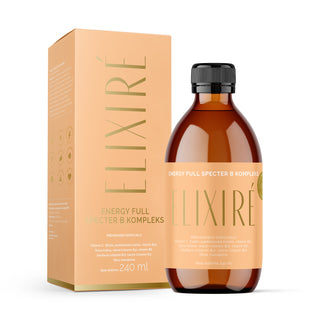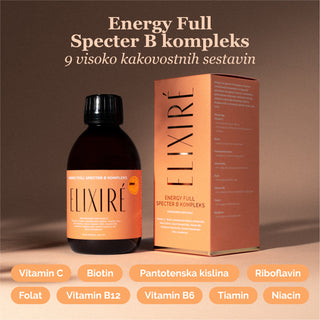Why hormonal balance after 40 is so important
Entering your 40s is a turning point for a woman’s body. This is when perimenopause often begins—a period in which estrogen, progesterone, and testosterone levels begin to fluctuate. (1*) These changes affect energy, metabolism, mood, sleep, cognition, and even skin.
When hormones are no longer in balance, the following can occur:
- fatigue and lack of energy
- weight gain, especially around the abdomen (2*)
- night sweats and hot flashes (1*)
- mood swings and brain fog (3*)
- sleep disorders (3*)
The Power of Natural Hormone Support After 40
If you're wondering how to naturally support hormonal balance after 40, you're not alone. More and more women are opting for a holistic approach that works with their bodies, not against them.
1. Eat according to your hormones
A hormone-friendly diet includes plenty of omega-3 fatty acids, leafy greens, cruciferous vegetables (broccoli, kale), and high-quality protein. Avoid sugar and processed carbohydrates, which can cause insulin fluctuations and put additional stress on your hormones. (4*)
For additional support for metabolism and energy, here is
View the product → BYE BYE MENO, passion fruit, vanilla and white peach flavor, nutritional supplement
2. Sleep – your hormone therapy
Hormone renewal occurs primarily at night. Quality sleep also means better regeneration, clarity of thought, and a stable mood. Create an evening routine that calms your mind and body – no screens, with meditation or reading. Deep sleep = deep hormonal balance. (5*)
This can help you. Elixiré Hyaluronic Radiance Skin Booster, as hydration and overnight cell renewal contribute to elastic skin and a greater feeling of freshness upon waking.
View the product → HYALURON RADIANCE SKIN BOOSTER, blueberry flavor, dietary supplement
3. Manage stress, regulate cortisol
Chronic stress increases cortisol levels, which further disrupts the balance of estrogen and progesterone. Help yourself with conscious breathing, walking, or yoga. (6*)
You can also support your body with antioxidant protection – this is where it comes in handy. Elixiré Collagen with Naticol® and Q10, which reduces oxidative stress, protects cells and maintains supple skin.
View the product → COLLAGEN with coenzyme Q10, white and yellow peach flavor
4. Exercise for hormonal balance
Regular physical activity improves insulin sensitivity, reduces inflammation, and boosts mood. Strength training is especially important to prevent muscle loss and slow down metabolic changes that occur after age 40.(7*)
After your workout, treat yourself to support with
Smart choice of dietary supplements
In addition to a balanced diet, vitamins and minerals also play a key role:
- B-complex for energy and proper functioning of the nervous system
- vitamin D for healthy bones and immune system
- antioxidants (vitamin C, Q10) for cell protection
- adaptogens for greater resistance to stress
When to seek additional support
Many changes can be mitigated through lifestyle changes, but for persistent or severe symptoms, it is wise to have hormone tests and consult a specialist. Sometimes the best solution is a hybrid approach – a combination of natural support and professional treatment.
Aging with strength and balance
Hormone balance after 40 is an opportunity to connect even more deeply with your body. When you understand the changes that are happening and make decisions accordingly, you can enter this period confident, energetic, and radiant.
Yours Elixiré support after 40
- Bye Bye Meno – hormonal balance, fewer unpleasant symptoms and more energy.
- Collagen with Naticol® and Q10 – protection against oxidative stress and supple, radiant skin.
- Hyaluronic Radiance Skin Booster – hydration, elasticity and nightly skin renewal.
- Immuno Booster with Vitamin D – healthy bones, a strong immune system and vitality.
- B-complex Energy Full Spectrum – cellular energy and support for the nervous system.
With a combination of exercise, nutrition, sleep, stress management and Elixiré With support, you can maintain hormonal balance, vitality, and natural glow after 40 – from the inside out.
Literature: (*)
1. Source: Perimenopause: From Research to Practice, (N. Santoro), https://pmc.ncbi.nlm.nih.gov/articles/PMC4834516/
2. Source: Menopause: Nutrition and Weight Gain, (BMS - British Menopause Society), https://thebms.org.uk/wp-content/uploads/2023/06/19-BMS-TfC-Menopause-Nutrition-and-Weight-Gain-JUNE2023-A.pdf
3. Source: Sleep, Mood, and Nutrition Patterns of Postmenopausal Women Diagnosed with Major Depressive Disorder by Menopause Periods, (C. Kabadayı Demir, S. Bayram, B. Köse, E. Köseler Beyaz, E. Yeşil), https://www.mdpi.com/2075-1729/14/6/775
4. Source: Nutrition and Neuroinflammation: Are Middle-Aged Women in the Red Zone?, (V. Bernier, A. Chatelan, C. Point, M. Strauss), https://www.mdpi.com/2072-6643/17/10/1607
5.Source: Sleep Disturbance in Perimenopausal Women, (K. Mee Park), https://www.chronobiologyinmedicine.org/m/journal/view.php
6. Source: The Efficacy of Strength Exercises for Reducing the Symptoms of Menopause: A Systematic Review, (AM Capel-Alcaraz, H. García-López, AM Castro-Sánchez, M. Fernández-Sánchez, IC LaraPalomo), https://pmc.ncbi.nlm.nih.gov/articles/PMC9864448/
7. Source: The musculoskeletal syndrome of menopause, (VJ Wright, JD Schwartzman, R. Intioche, J. Wittstein), https://www.tandfonline.com/doi/full/10.1080/13697137.2024.2380363

